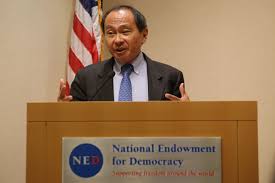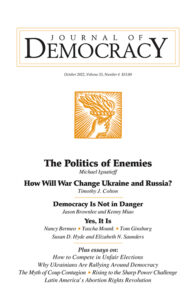 Autocratic regimes like China and Russia exhibit weaknesses of two sorts, says Stanford’s Francis Fukuyama:
Autocratic regimes like China and Russia exhibit weaknesses of two sorts, says Stanford’s Francis Fukuyama:
- First, the concentration of power in the hands of a single leader at the top all but guarantees low-quality decision making, and over time will produce truly catastrophic consequences.
- Second, the absence of public discussion and debate in “strong” states, and of any mechanism of accountability, means that the leader’s support is shallow, and can erode at a moment’s notice.
Supporters of liberal democracy must not give in to a fatalism that tacitly accepts the Russian-Chinese line that such democracies are in inevitable decline. The long-term progress of modern institutions is neither linear nor automatic, he writes for The Atlantic:
Over the years, we have seen huge setbacks to the progress of liberal and democratic institutions, with the rise of fascism and communism in the 1930s, or the military coups and oil crises of the 1960s and ’70s. And yet, liberal democracy has endured and come back repeatedly, because the alternatives are so bad. People across varied cultures do not like living under dictatorship, and they value their individual freedom.

Former NED board member Francis Fukuyama
No authoritarian government presents a society that is, in the long term, more attractive than liberal democracy, and could therefore be considered the goal or endpoint of historical progress, adds Fukuyama, a former board member at the National Endowment for Democracy (NED).
Isolated batch
More often than not, mass electoral contests have proved a bulwark against would-be tyrants, note analysts Jason Brownlee and Kenny Miao. Multipartism forces civilian politicians to vie for and share power, without the armed forces picking winners. Even when that system suffers from ills such as polarization and majoritarianism, it stands apart from the small number of erstwhile democracies that are now led by executives who have managed to install themselves for life, they write for the Journal of Democracy:
 If every power-hungry leader could mimic Putin or Erdoğan, today’s gallery of autocratic rogues would fill many magazine covers. Instead, these figures stand not as “vanguards of a global trend,” but as an isolated batch. While no democracy is invincible, the countries that have been practicing some form of competitive electoral politics are well positioned to preserve that tradition.
If every power-hungry leader could mimic Putin or Erdoğan, today’s gallery of autocratic rogues would fill many magazine covers. Instead, these figures stand not as “vanguards of a global trend,” but as an isolated batch. While no democracy is invincible, the countries that have been practicing some form of competitive electoral politics are well positioned to preserve that tradition.
To regain its lost international stature – as measured by opinion polls confirming diminished U.S. credibility and legitimacy – American democracy must overcome the challenges of partisan politics, institutional gridlock, and instability, argues Bruce Stokes, a Visiting Senior Fellow at the German Marshall Fund. The foreign policy establishment needs to see the revival of American democracy as the cornerstone of future U.S. global leadership.
Addressing the global struggle between democracy and authoritarianism requires the United States to renew its own democracy. Those who care about U.S. stature and influence in the world must engage in strengthening American democracy at home. To paraphrase former Speaker of the House Tip O’Neill: “All foreign policy is now local,” he writes for Foreign Affairs.







